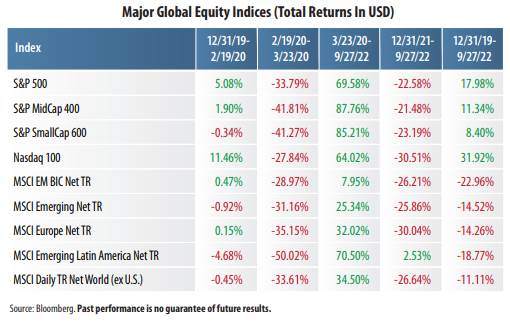
View from the Observation Deck
1. Today's blog post features the total return performance figures for the major global stock indices over four specific periods since the start of 2020.
2. The first column of total returns in the table above indicates that, with the exception of the S&P SmallCap 600 Index, U.S. equities were outperforming their foreign counterparts prior to the peak in the S&P 500 Index on 2/19/20.
3. Due largely to the onset of coronavirus (COVID-19), a major shift in sentiment occurred after the close of trading on 2/19/20. The second column of total returns captures the depth of the sell-off in the stock market in the U.S. and abroad.
4. The S&P 500 Index actually crossed over into bear market territory (a 20% or more price decline from the most recent high) at the close of trading on 3/12/20. It only took 16 trading days, the fastest path to a bear market ever. The sell-off did not cease until 3/23/20.
5. The third column of total returns shows the rebound in progress. This includes the market (S&P 500 Index) dipping into bear market territory again, selling off 23.96% on a price-only basis (dividends not included) from its all-time closing high on 1/3/22 through its 2022 bottom on 9/27/22. U.S. equities significantly outperformed their foreign counterparts over that period.
6. The fourth column reflects the year-to-date total returns through 9/27/22. With the exception of the Nasdaq 100 Index, it has been more of the same with respect to U.S. stocks outperforming most of the foreign stock indices, albeit by a much narrower margin. Latin America has benefitted from the rise in commodity prices in 2022, including oil.
7. The fifth column reflects the total returns since the start of 2020. Again, the U.S. equity indices are dominating their foreign counterparts.
8. From 12/31/19-9/27/22, the U.S. dollar rose by 18.38% against a basket of major currencies, as measured by the U.S. Dollar Index (DXY), according to Bloomberg. The surge in the U.S. dollar has provided a drag on the performance of unhedged foreign securities held by U.S. investors over the period, in our opinion.
9. Foreign stocks look less expensive than U.S. equities based on their forward-looking price-to-earnings (P/E) ratios. Bloomberg's 2022 year-end P/E estimates for the major indices in the table are as follows (9/28/22): 16.62 (S&P 500); 12.16 (S&P MidCap 400); 11.65 (S&P SmallCap 600); 21.29 (Nasdaq 100); 11.53 (MSCI BIC); 10.76
(MSCI Emerging); 10.57 (MSCI Europe); 6.53 (MSCI Latin America); and 11.05 (MSCI World ex-U.S.).



